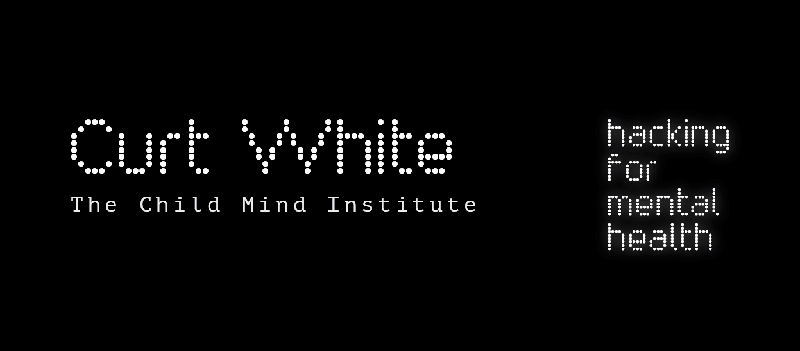Quite often we see applications of hacking and DIY in the medical field. From 3D printed prosthetics to hacked insulin pumps, there’s a wide variety of stuff you can do, but what about psychology? That’s what our Hack Chat this Friday is all about.
 Our guest for this week’s Hack Chat is Curt White. He’s been building medical devices for years, and when he’s not doing that he’s creating interactive installation art and costumes. At work he’s a device and sensor developer at the Child mind Institute MATTER Lab where he designs and researches wearable medical devices for children with mental health issues. He’s currently working on gesture detection using wearables, machine learning optimized for microcontrollers, and building and fixing prototypes.
Our guest for this week’s Hack Chat is Curt White. He’s been building medical devices for years, and when he’s not doing that he’s creating interactive installation art and costumes. At work he’s a device and sensor developer at the Child mind Institute MATTER Lab where he designs and researches wearable medical devices for children with mental health issues. He’s currently working on gesture detection using wearables, machine learning optimized for microcontrollers, and building and fixing prototypes.
For this hack chat, we’ll talk about how mental health can be addressed by building things with a focus on wearable devices and sensor data. How are wearables challenging the outdated and arbitrary classification of psychiatric disorders, and what is the potential for audio, EEG, and fMRI to help us progress beyond checklist diagnosis? We’ll also talk about:
- Hacking for mental health
- Addressing the intangible with the tangible
- Working with medical researchers
- The fact that you don’t need an IRB if you don’t accept federal funding, or are working in Belize.
You are, of course, encouraged to add your own questions to the discussion. You can do that by leaving a comment on the Hacking For Mental Health Event Page and we’ll put that in the queue for the Hack Chat discussion.
Our Hack Chats are live community events on the Hackaday.io Hack Chat group messaging. This week is just like any other, and we’ll be gathering ’round our video terminals at noon, Pacific, on Friday, August 24th. Need a countdown timer? Go go go
Click that speech bubble to the right, and you’ll be taken directly to the Hack Chat group on Hackaday.io.
You don’t have to wait until Friday; join whenever you want and you can see what the community is talking about.
















IRBs – a group of people of questionable sanity that are reviewing the effects of an experiment on a group of people being studied because they may have questionable sanity.
Me? No problemo – have never bothered to question my sanity because of my absolute and solid normalcy. My sanity can be vouched for by the three Klingon warriors standing next to me…
“Many hackers tend to be outright sociopaths”
Have a data point or some reference for that statement?
There is no standard definition for “hackers”, so let us look at a representative group of hardware and software engineers. Myself, and most of the other engineers that have been my colleagues for the last several decades my have been at times amoral, but they were always legal and ethical.
The the ‘worst’ character of this ad hoc reference group? That would be me – no one else has close to my contempt towards humanity. Yet have never physically hurt anyone (outside of my military hitch), have never stolen, robbed, or intentionally broken others’ property, and have always paid my taxes and responded to juror summons.
Generally think that your generalizations have a general tone lacking general knowledge of the general characterization of said demographic. Perhaps we are sociopaths, as the sentence was designed to drive people bonkers, or to just generally piss off people…
.
Your Narcissistic rage is clearly showing, and thank you for proving my point with your emotional blindness.
Still an inexperienced predator to be baited so easily, but I am sure you will grow up to be someone terrible.
Never trust this kind… and there are dozens of other ways to spot people like this.
Don’t eat my cat — I know it is in your nature, but try to act human.
=D
i value cats more than humans.
“Socially engineering people with mental health issues for your own purposes is unethical.”
Then you can call 1 of my former bosses “unethical”. She was a master at manipulating my bipolar when I was in the early days of my diagnosis.
That isn’t funny at all, and hopefully you contacted a disability rights organization.
Remember to get lots of exercise outdoors — even on your low days friend — as I’ve seen a lot of ex-service people manage it that way.
https://www.youtube.com/watch?v=LO1mTELoj6o
this is why ive adopted a “give them nothing” strategy. people who exploit people with mental disorders for personal gain should have to pay astronomical taxes to support entitlement programs for people with mental disorders. by not working for those people, or anyone for that matter, you can make sure to maximize karmatic effect.
then again many of the exploiters are themselves suffering from a mental disorder, despite being high functioning. i really dont have a problem with the resulting feedback loop. my job as a crazy person is to make sure i keep the crazy contained such that it does not cause others to be crazy.
Ha, I have a similar issue :) They say the best way to combat depression is to do things you enjoy….
And keep a regular schedule, eat at consistent times during the day, get regular exercise (best out in the sunshine), and sleep well at night.
Not that I’m able to do that all either all the time… But I definitely feel better when I can.
We who have depression, bipolar and suicidal issues have enough to deal with without people trolling. I’m beginning to think there is not a single human activity where we can go or do where trollers are not ready and waiting to dump on another person.
if i didnt think the trolls also had mental disorders i would probably be pissed off about it.
Don’t sweat the trolls. They pass away in time — like as soon as we can get around to moderating.
Marking such comments as inappropriate helps us catch the ones we might otherwise miss. You can help.
Hah, I might be needing one of these :-)
Want to avoid prison?
Stop
Bragging
About
It
Hi everyone! Looks like we have a really interesting discussion going here. If anyone has questions about medical devices for mental health or hacking in the medical device space more generally let me know!
I’ve thought before, if you can use EEG, heart pulse, and maybe sweat sensor and build a wearable system to help people who have anxiety/panic attacks, schizophrenic/paranoid attacks.
So when the system detects your in distress it sends a message to the family and alerts your phone where and app will prompt you through mindfulness exercises/cognitive behavioral exercises.
I think it could be done…
Kind of like fall detection devices ( https://www.ncbi.nlm.nih.gov/pmc/articles/PMC4087103/ ) used in geriatric populations except for mental health, right? As far a device with alerts go, false positives are an issue. Don’t want a mental health emergency notice sent to your mom if you climb the stairs super fast. I like low hanging fruit and easy targets. For example, accelerometry data on your phone to monitor activity level (“actigraphy” as they call it in research). Phone activity, in general, to help monitor sleep patterns.
One of the most insidious things about mental illness is its ability to disable your problem-solving abilities. Someone undergoing a psychotic episode, full-fledged mania, paranoid fantasies or clinical depression may not have the ability to utilize devices or apps. Working at the intersection of technology and mental health has made me aware that in most instances technology isn’t the answer. A network of social support (face to face relationships) and a society willing to care and invest (social safety net) in those who need help the most is crucial. BUT there are definitely instances in which technology can make a big difference.
Hey! We who have depression, bipolar and suicidal issues have enough to deal with without people trolling. I’m beginning to think there is not a single human activity where we can go or do where trollers are not ready and waiting to dump on another person.
On call central
As mentioned above: use the “report comment” button for trolls. We’ll delete them.
You have the power!
(We’re looking out too, but we’re just a couple people.)